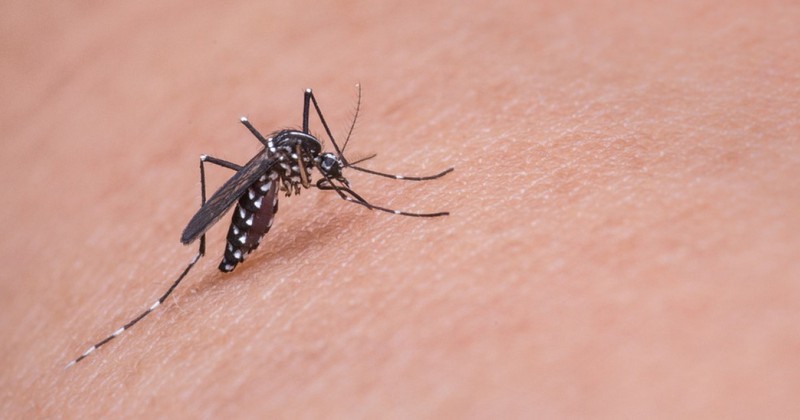Japanese encephalitis: symptoms, causes and epidemiology

This pathology is transmitted by mosquito bites and can be very serious.
One of the most common viral infectious diseases in Asia is Japanese encephalitis. Although outbreaks are usually controlled by mass vaccination and symptoms are usually not severe, in some cases, this virus is associated with a dangerous the virus is associated with a dangerous inflammation of the brain, which can that can leave significant sequelae or even lead to death.
In this article we will describe what Japanese encephalitis is, what causes it and what are its main symptoms and signs. and main signs. We will also explain where this disease frequently appears and what measures can be taken to prevent contracting it, as well as the care that is usually recommended in case it develops.
What is Japanese encephalitis?
Japanese encephalitis is an infectious disease contracted through mosquito bites. is contracted through mosquito bites.. It is caused by a virus endemic to 24 countries in East, South and Southeast Asia and the Western Pacific Islands.
In places such as China, Thailand, Korea, Vietnam, India, Indonesia, the Philippines, Taiwan, Myanmar, Sri Lanka, Cambodia, Laos, Nepal and Malaysia, cases of Japanese encephalitis are very common, although vaccines are available to prevent them; curiously, in Japan this disease is rare due to the effectiveness of immunization programs.
The virus that causes Japanese encephalitis is classified in the family of the is classified in the flavivirus family, to which the Japanese encephalitis virus also belongs.It also includes yellow fever, dengue fever, West Nile virus and the viruses that cause some types of hepatitis.
Although in most cases the virus does not cause the appearance of severe symptoms, more than one third of the people ill with Japanese encephalitis suffer permanent sequelae and approximately 30% die as a result of the alterations derived from the brain inflammation.
Signs and symptoms
In most cases, contracting the Japanese encephalitis virus does not cause any symptoms, or only headache and fever. However, sometimes inflammation of the sometimes an inflammation of the brain (encephalitis) develops, which can be severe. which can become severe.
In one out of every 100 to 250 cases, the infection progresses to a life-threatening illness 5 to 15 days after the mosquito bite. The characteristic signs and symptoms of this phase are as follows:
- Headache
- Severe fever
- Vomiting
- Disorientation
- Tremors
- Seizures
- Stiff neck
- Spastic paralysis
- Cerebral coma
Slightly less than one-third of people infected with Japanese encephalitis are permanently affected by this virus. The following sequelae are common sequelae related to neurological disturbances, such as partial paralysisThe disease is usually associated with neurological disorders such as partial paralysis, loss of speech, and cognitive and behavioral disturbances.
Causes and epidemiology
Japanese encephalitis is transmitted mainly by the mosquito species Culex tritaeniorhynchus and Culex vishnui. Animals such as farm pigs and herons frequently carry the virus.Mosquitoes infect humans and other animals, especially horses, through their bites.
The disease mainly affects populations in rural areas and regions surrounding cities because of the closer proximity of animals; it is also associated with rice cultivation and flood irrigation. In comparison, it is relatively rare in urban areas.
In Asia, approximately 70,000 cases of Japanese encephalitis each year; the diseaseThe disease kills between 13,000 and 20,000 people annually. However, most people in countries where Japanese encephalitis is endemic become immune after vaccination or after contracting it during childhood.
Large epidemics of Japanese encephalitis tend to occur in summer, although in countries with tropical climates the prevalence is high throughout the year and increases even more in the rainy season; this is related to the increase in the number of mosquitoes. The frequency of occurrence of severe outbreaks ranges from approximately 2 to 15 years.
Prevention and treatment
There is no cure for Japanese encephalitis. treatment is oriented to the reduction of symptoms, as well as to theas well as the favoring of the Biological processes that allow the elimination of the infection. For these purposes, rest, large amounts of fluids and antipyretic and analgesic drugs are prescribed.
In general, in countries in Asia and the Pacific where this virus is common, there are medical protocols aimed at minimizing the risk of contracting the disease and suffering its most serious effects, mainly through vaccination and surveillance for new cases and epidemics..
Since people in other regions of the world are not as well prepared to defend themselves against Japanese encephalitis, it is advisable to be vaccinated preventively before traveling to places where the virus could be contracted. Also, using repellent products and covering arms and legs can prevent mosquito bites.
(Updated at Apr 13 / 2024)